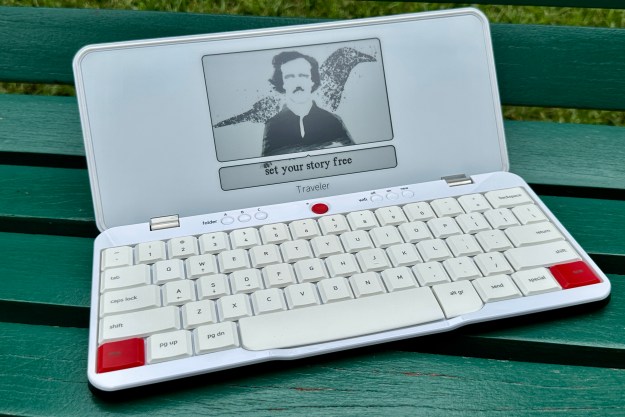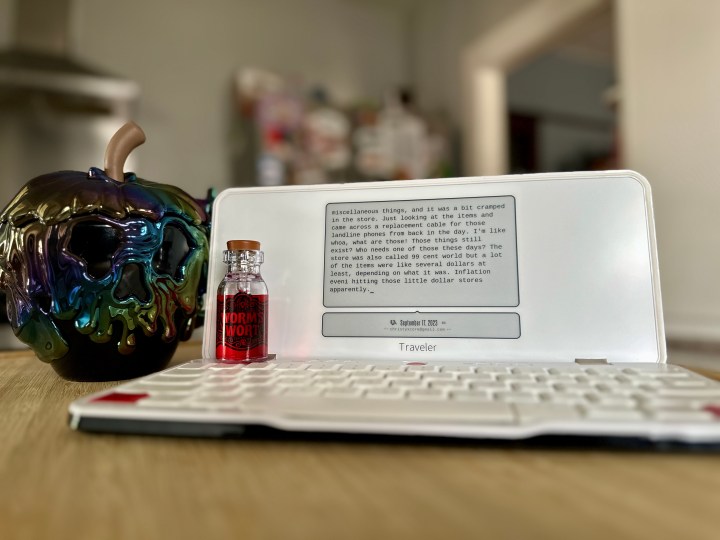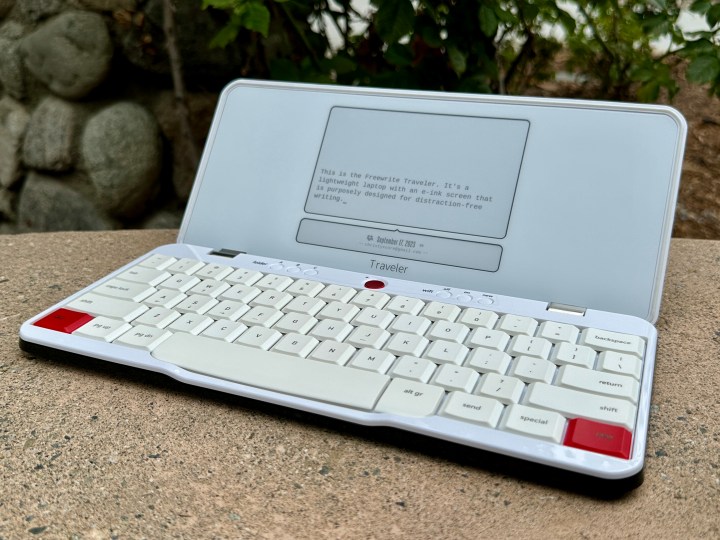
“The Freewrite Traveler is a unique writing tool that helps you get your words drafted. But it’s a niche product for a very specific audience and has a high price tag.”
- E-ink display
- Keyboard feels great to type on
- Super compact and lightweight
- Distraction-free writing
- Long battery life
- Easy to set up
- Syncs with third-party cloud services
- Very expensive
- Small display
- Cumbersome to navigate
- Has a learning curve
I have always loved writing. When I was a little kid, I loved reading books and coming up with my own stories, as silly as they may have been, and writing them down. Even if they were never to be read by others, I just loved the act of writing and letting my words flow out. English was my favorite subject in school because I loved to read, write, and analyze.
Fast-forward to the present day, and I consider myself very lucky that I get to do what I love as a career. Here, I write about mobile tech, but when I’m off, I also enjoy just writing down my thoughts in a journal, whether that’s in an actual notebook with a pen on paper or on my iPhone 15 Pro or a computer.
But one negative about using those things to write (aside from the actual pen and paper) is that there are a ton of other things that can distract you from your words: social media, YouTube, email, messages, notifications, work, etc. I’m the kind of person who gets easily distracted, so sometimes it’s actually difficult for me to just constantly write, especially on my Mac.
I recently came across the Astrohaus Freewrite family of writing products when I saw someone in my Mastodon timeline talk about the new limited-edition colors for the Smart Typewriter. I found the company had a whole range of writing tools for different occasions, all with a focus on distraction-free writing, and I was instantly pulled in by the Freewrite Traveler.
So, is this little distraction-free writing tool worth the hefty $500 price tag? Let’s find out.
A gadget made just for writing

The Freewrite Traveler looks like a very small laptop. It’s about the size of a standard laptop keyboard, which is what you’ll find on the inside, along with an e-ink display on the other half of the clamshell.
When the Freewrite Traveler is folded up, it’s relatively small and should fit into a backpack or laptop bag without any issue. Or you can just carry it around as is. It’s also super lightweight at just 1.6 pounds. The full product dimensions are 11.3 x 5.0 x 0.97 inches.
The body of the Freewrite Traveler is made with a glossy black polycarbonate material, which I’m not a huge fan of since it easily attracts fingerprints and smudges. On the top lid, you’ll find the “Freewrite” logo in the center.

On the inside, there’s a full-size scissor-switch keyboard with low-profile keys. But unlike most laptop scissor-switch keyboards, the one in the Freewrite Traveler has about 2mm of travel, so it does feel slightly better than, say, the older MacBook scissor-switch keys. I still prefer an actual mechanical keyboard, but during my time spent with the Traveler, its keyboard was quite nice to type on.
There are some unique buttons above the keyboard’s number row. On the left are three “folder” buttons that allow you to switch between folders where you’re saving your drafts, the power button, and three more buttons for Wi-Fi (on, off, and to connect to a new network). The power button, as well as the two “New” keys on the keyboard, are accented in a catchy red color that contrasts nicely with the white body. All of these buttons are tactile and have a very satisfying click when pressed.
The Freewrite Traveler charges via USB-C, and you can find the port for it on the left side, similar to a laptop. You get a USB-C cable in the box, but no power adapter. A single charge should provide about four weeks of runtime, which makes sense considering that it’s a low-power e-ink display.
The USB-C port can also be used for offline data transfer to a computer, as well as accessories like an external keyboard.
Stealing a page from the Kindle’s book

The display of the Freewrite Traveler is the most unique thing about the device. It uses e-ink technology (similar to a Kindle) ans is actually easy to see in pretty much any lighting situation, even direct sunlight. However, there is no backlight, so it isn’t as easy to see in dimly lit environments.
Though the Traveler is about 11 inches long and 5 inches tall, the e-ink display is actually much smaller than that. The writing canvas of the display is 121mm x 70mm, and the status window underneath it is just 121mm x 15mm. You can adjust the size of the on-screen text, which changes the amount of text that is displayed on the screen at once. The little status window will show you the date of your draft by default, but you can also see various bits like reading time so far for your text, as well as character and word count.
While the display looks good, it is definitely a bit small compared to the actual size of the device. There’s a lot of unused space on the display half that just seems like a waste, and to be honest, the display could have been easier to see if it was larger.
Why the Freewrite Traveler works so well

If you are solely looking for a distraction-free writing tool to help you just sit down and write, then the Freewrite Traveler is great for the job.
Getting the Traveler set up is easy and only takes a few minutes. You need to set up a Postbox account to use Freewrite products, but it’s (thankfully) free. Postbox is Freewrite’s cloud application that lets you configure your device’s settings and access your documents. It is also the bridge to getting your Freewrite Traveler (or other Freewrite device) syncing with a third-party cloud service — like Dropbox, Google Drive, Evernote, or Microsoft One Drive. Once you have Postbox set up, it’s pretty much smooth sailing.
I tend to get easily distracted when writing on my computer due to the fact that the internet is so available. The Freewrite Traveler is helpful when I just want to sit down somewhere and write. I find it amazing, as it just allows me to let my words flow out through the keyboard and onto the e-ink display. It also feels nice to type on the integrated scissor-switch keyboard.

Personally, I think if I was working on a novel or short story, the Freewrite Traveler would be incredible for helping me get drafts done. Unfortunately, I am a bit rusty on the creative writing aspect, so I have mostly just used the Traveler as a little journal. It’s great for just helping me get my random thoughts out of my head and onto a screen.
I also like how it seamlessly syncs your drafts with your third-party cloud-syncing service of choice. I set mine up with Dropbox, as that’s what I’ve been using for years for everything. As long as it’s connected to Wi-Fi, your drafts get synced. Even if you’re writing on it without Wi-Fi, the next time it connects, your drafts and any changes and edits will get uploaded.
The Freewrite Traveler also gets pretty great battery life. A single charge will last you about four full weeks, depending on how often you use it. And it’s relatively small and lightweight enough that taking it with you anywhere is a breeze. Just pop it open and start writing.
If that’s the kind of writing tool you’ve been searching for, then the Freewrite Traveler is great.
A few things that could be improved

One of the biggest quirks of the Freewrite Traveler, I think, is the size of the e-ink display. Compared to the overall size of the device, the display is pretty small, as it is surrounded by a lot of wasted white space. I really wish that the display was wider, even by just a little bit. It would help with being able to see more of what you’ve written, which is something I like.
While the e-ink display is very easy to see in decent lighting conditions, I also wish that it had a backlight when you want to write in darker environments. For example, I like to write down my thoughts before bed, but I don’t like having a lot of lights on at that time. As such, using the Traveler in bed is a little difficult without a backlit display.
I’ve also noticed that there is a bit of a delay with your words showing up on the display if you type quickly. This is due to the e-ink technology, of course, but it’s still a bit irksome. I know I make some typos as I type, but I won’t be able to see them until the display catches up with my typing. And I like to fix my typos as I type, so this slows me down. I know that the point of the device is to get a draft down, but it still bothers me when I see typos.

Speaking of, the Traveler does not have any kind of spellcheck as you type. This may result in more work when it comes to editing your drafts. I did notice that the drafts are saved in a .docx format, which I’m not too fond of. I personally like writing in plain text, so I would prefer to choose the file format drafts get saved as.
Navigating through your draft is also a bit cumbersome since there are no arrow keys. Instead, to move the cursor around, you have to press one of the New keys at the same time as the W (up), S (down), A (left), or D (right) key to move one character at a time. You can also press PG UP or PG DN to move one screen up or down too. If you see a typo and must fix it right now, that’s how to navigate around. The Traveler was not meant for editing, just drafting, so trying not to do that too much with it is best for your sanity.
Lastly, I think the price of the Freewrite Traveler is a little too steep. I suppose if you’re a serious writer using it to craft your next novel, then it could be worth the cost. However, if you’re just a casual writer who just wants less distractions, then the $500 cost is a little tough to swallow.
Should you spend $500 on a writing device?

If you do a lot of creative writing for fiction, short stories, novels, poetry, journaling, etc., then the Freewrite Traveler is a great tool. You have zero distractions to prevent you from getting your words out, and the keyboard feels great to type on. Setup is easy and your drafts get synced automatically with your preferred cloud service, so you can do your editing on your computer.
However, this is still a pretty niche product. I enjoyed using it, but for the type of writing that I do on a daily basis, it doesn’t fit my workflow well. I need to format my articles, I tend to have pages that I need to reference regularly, and I edit as I go. But for my journaling needs, it’s great! I’m just not sure it’s $500 great.
For most people, I think your money would be better spent getting a tablet or laptop. But if you are serious about drafting your next book, the Freewrite Traveler is worth considering. It’s weird, quirky, and unlike just about anything else out there.
You can buy the Freewrite Traveler directly from the Freewrite website for $500 (plus shipping) or on Amazon for $529 with free shipping.
Editors’ Recommendations